MARINE CORPS VIETNAM TANKERS
HISTORICAL FOUNDATION®
THE BREECH BLOCK©
![]()
![]()
![]()
![]()
![]()
![]()
|
|
|


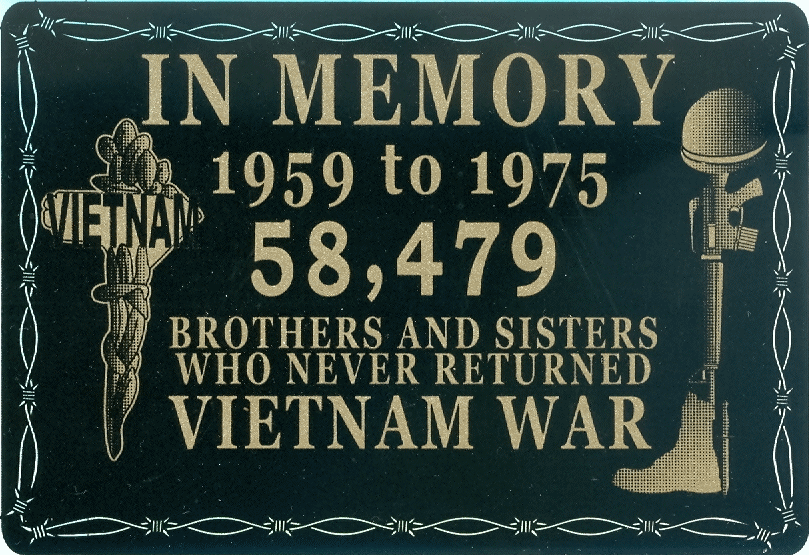 |
|
Visit our web site at
http://mcvthf.org/MCVTHF.htm |
| “ATTENTION ALL SHITFISTERS” |
| I just ran across a red 23” X 33” red banner w/a black VTR “H 53” sewn on and the names Bob, Jimi, Joe, Dutch, Honcho, Les, John, Duck, and “ALL NEW BEES” embroidered in yellow. Can’t tell you when, where, or from whom I acquired this – probably at an earlier Vietnam Marine Tanker Reunion. Ray. |
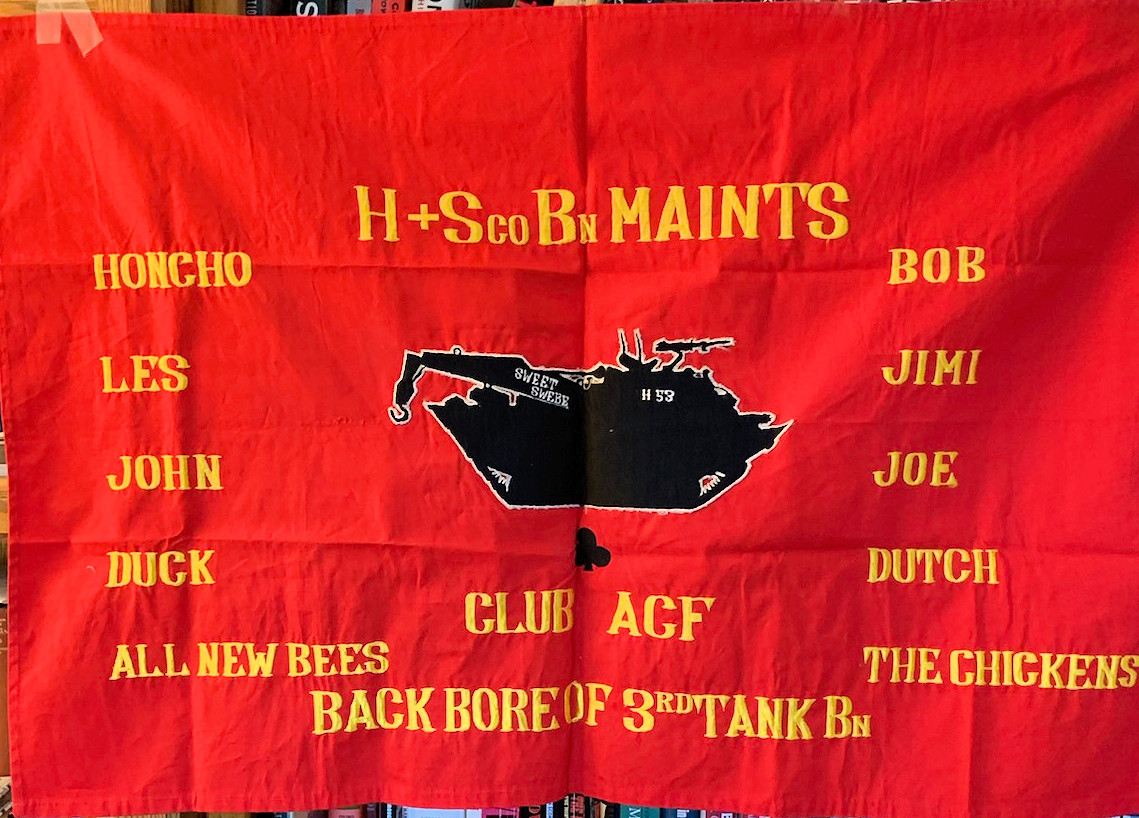 |
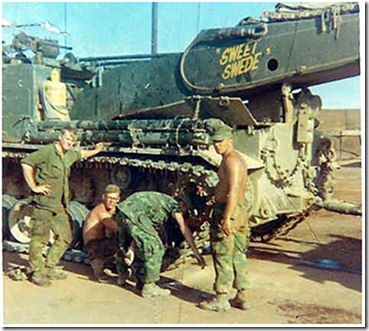 |
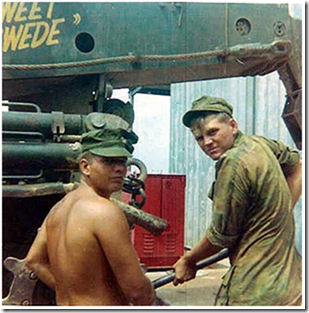 |
REMEMBERING CHARLIE DENTON
Members of the 3d Platoon, Company “A”, 3d Tank Battalion, 3d Marine Division, Fleet Marine Force, Pacific received a request, by way of the Marine Corps Tankers Historical Foundation, from the family of Corporal Charles Denton. Cpl. Denton served as a tank crew member on A-31 at Chu Lai in The Republic of South Viet Nam during 1965-1966.
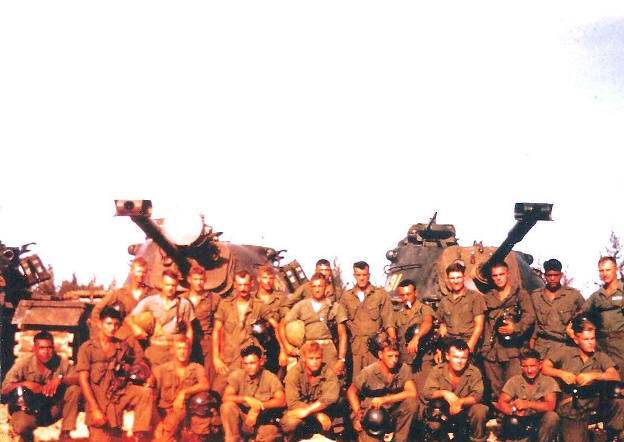
Charlie is in the front row kneeling and third in from the right
Family, friends, and Marines he had been close with had lost track of Charlie. The family knew, based on newspaper reports, that he had been awarded the Silver Star Medal for "Conspicuous gallantry and intrepidity in action” on 18 August 1965 during OPERATION STARLITE, and also a Purple Heart Medal for wounds received. The family believed that Charlie had left the Marine Corps and that he had passed away in 1983.
What follows is a collection of stories from a few members of that platoon as they lovingly remember one of their own.
Contributed by Jim Thompson.
In the late 90's the Internet was part of my life, and one of the first thing I did was to search for those who were important but no longer present. It took years to finally connect with some of those with whom I served, but strangely enough my search for Charlie stumbled upon another name I knew - Ken Zebal. Thus, a weird twist of fate turned a search for a friend into an open door to many friends and comrades in my past.
A few incidents Charlie and I shared still come to memory.
"Breaking track" was a job we hated but did as a matter of course. The tank's treads are joined to one another by two iron unions (end connectors) which have to be pounded off with a long and heavy steel bar being struck with a sledge hammer. This steel bar must be held nearly horizontally by one man as another man hits it with great force using a sledge. If the man wielding the sledge misses the bar or loses control of the hammer, serious injury is possible so this involves trust and steady nerves. Crew members would spell another to prevent fatigue and crews from other tanks would often join in the labor. Because we camped within a few yards of the ocean, these end connectors became thoroughly rusted to the treads. At one point I was holding the bar and Charlie was pounding it with the sledge when a shard of hot metal separated from the end of the bar and became slightly embedded in my bicep. I lowered the bar and Charlie looked at me like I'd lost my bearings before he saw what had happened. Then he grinned that famous wide grin of his and we continued.
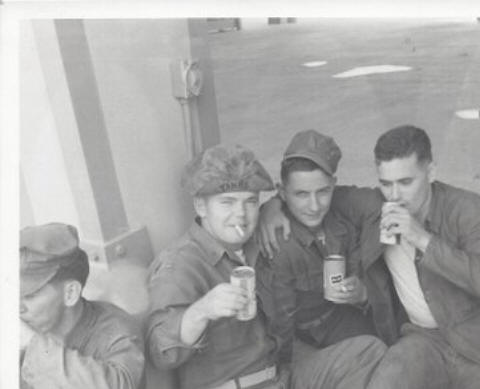
Charlie is second from the left with a cigarette and a can of beer
We remember things differently and conflicting stories from our experiences in OPERATION STARLITE should be expected. Charlie's and my tank were hit within seconds of each other, and after my tank commander was evacuated, I heard that another tank had been hit. Since our radios had been damaged, I could not communicate with the driver (LCpl Cunningham) nor did I have any idea of what the tactical situation was. I remember someone ground-guiding our tank back to a new position - it may have been Charlie. At that time, I didn't see any tank burning. Sometime later my tank took another hit and began burning; it was later blown apart by the engineers (I've been told). After STARLITE things were different - we were hardened. Shared experiences in combat and within the confused and illogical matrix of the Marine Corps and upsetting social and political environment had an effect on all of us.
Charlie and I both returned to Camp Lejeune from 30 days' leave driving cars. I believe his was a 62(?) Ford hardtop. At one point it was running poorly and Charlie did some engine work. Shortly thereafter we piled into the Ford for a quick trip to the slop chute but when we arrived the engine was on fire. Charlie popped the hood, removed the air filter and doused the engine with the only thing available at the moment - dirt from the parking lot. Again, he had to clean the carburetor, but he made it work.
Nicknames - it seems everyone was generating them, and some of them stuck. As Charlie and I spent more time together they began to refer to us as the "Two Bantam Roosters", which invokes two images: small and fierce (this occurred when we were back at Camp Lejeune). By that time, we were both described as having 'bad attitudes', which was true. Bantam roosters are fighters, but our fights now were not physical, but verbal and mental - often within our own minds.
Neither Charlie nor I were great drinkers, but we'd enjoy a beer or two on occasion. One night found us in a local bar just talking and enjoying being off-base when a gentleman joined us and asked if one or both of us were interested in making some extra cash. Of course, we were! He explained that the task was simple. We would pick up a car and drive it to New York or New Jersey, park it, take the bus back to base and collect $500. Charlie was more world-wise than I and he warned me with his eyes that this was not a good idea and politely declined the offer. I'd had no idea that this was a moonshine run.
Throughout those and subsequent days, my friend Charlie was a rock of refuge that I missed when the time for final partings arrived, and still miss today. Charlie must have experienced the confusion of returning to "the real world". My own return was contentious.
Charlie is still alive in my memory, feisty, smiling and ready for the next task.
Ky Thompson’s note: - Jim was the gunner on A-34 and heroically saved Sgt Ed Sipel’s life by applying a tourniquet to Ed’s leg which had been traumatically amputated by enemy fire.
Contributed by Ken Zebal, Major, USMC (Ret.).
My relationship with Charlie aka Cpl. Charlie Denton was good and we were close. We first met at Camp Hansen on Okinawa and although we served on different tank crews, he on A-31 and I on A-32, we got along very well. As a platoon, we trained on Okinawa with 3/3 for many months before conducting the amphibious assault at Chu Lai and, as a platoon, we equally shared the same work and field experiences. Charlie was a good fit and got along with everyone. He was also very competent tanker and a hard worker. His nickname was head because the size of his head appeared disproportionately large when compared to the rest of his body. I can describe Charlie as being medium height and having a stocky build with an agreeable disposition. I would also say that Charlie’s closest buddy in the platoon was Jim Thompson.
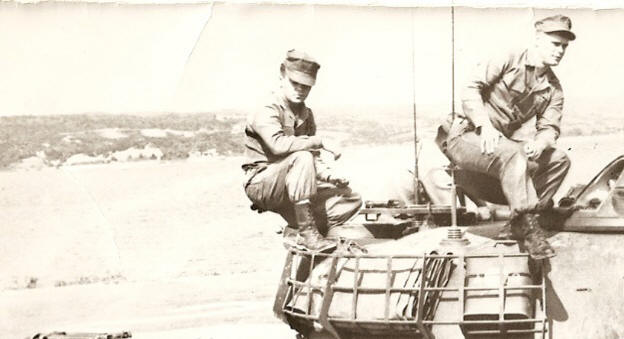
Charlie is on the far left in this photo taken on Okinawa in early 1965.
At Chu Lai our platoon’s command post was co-located with the 3/3 command post in the sand right on the beach. On a day-to-day basis we performed maintenance on our vehicles, conducted combat patrols and provided direct support to each of the infantry companies. The weather at that time of year ranged from 85 degrees with 85 percent humidity to around 100 degrees with 100 percent humidity. We seemed to be constantly perspiring even though we were right on the beach. Heaven only knows what the heat and humidity was a few miles inland. We performed manual labor on our tanks, day-in and day-out first and foremost because tanks required it to stay combat ready. Secondly, because we were operating in sand, and the friction took a heavy toll on the suspension system including; track, end connectors, center guides and the sprockets all of which were heavy and required hands-on work to maintain readiness. On the beach with 3/3 we were lucky and had at least one hot meal each day. However, when on an outpost with a rifle company or on patrol we ate C-rations. We washed our bodies and washed our clothes in the ocean which required us to rub the dried salt off of our bodies and clothes to avoid rashes. Initially combat was light. We had occasional snipers and every now and again we received mortar attacks and small arms fire but in general it was fairly quiet. However, when on outposts we encountered mines, booby traps, small arms fire and some automatic weapons fire. Early in the war we couldn’t fire at the enemy due to the rules of engagement. We would receive enemy fire, report it to the 3/3 CP and request permission to return fire. That permission rarely came and that’s how it was until the real shooting war started.
Charlie was the first member of our platoon to go on R&R and I’m assuming that was in early August 1965. The process our platoon sergeant, S/Sgt DJ Clark, developed was something like this; Sgt Dan MacQueary wrote everyone’s name on torn slips of paper and placed them in a utility cover, stirred them up and then a Sgt picked the winning slip of paper – Charlie Denton was #1. Because none of us had knowledge of a preferred location for R&R or much experience in Asia, except for Okinawa, Charlie chose Hong Kong although I don’t recall the other choices which likely would have included Tokyo and Bangkok.
After his return from Hong Kong and right before STARLITE my name was #2 to be picked for R&R. Based on Charlie’s glowing review, I also chose Hong Kong. That was the easy part. The harder part was getting from our Plt. CP with 3/3 on the beach to Hong Kong. We somehow or other wrangled up a set of khakis for the trip and because I was a new Corporal the task was complicated by finding a shirt with Cpl. chevrons. This was no mean feat given that all of our uniforms and what little civilian clothing we owned were locked away in seabags stored in a warehouse at Camp Hansen, Okinawa. My luggage for R&R was either a sandbag, laundry bag or a water proof (willie peter) bag – I forget. From the Platoon CP there was a jeep ride to the Company CP and then after checking out with the company there was another short trip to the airstrip for the 30-minute C-130 flight north to Da Nang and, of course, there were the inevitable delays and hurry-up and waits. Once we arrived at Da Nang things changed.
Air freight at that time was about a big as a golf course starters shack. We signed in, weighed in and then waited outside under the shade of a tree during mid-August in RVN at approximately 95 degrees and 95 percent humidity – in khakis. At Da Nang’s air freight, we were then required to get additional shots and blouse our boots (we had no dress shoes) which seemed very strange. I found myself doubly blessed by running into a former Drill Instructor who was then serving as a platoon sergeant with Bravo 1/9. He remembered me and then without hesitation gave me a rifle and put me on the lines defending Da Nang airfield that night – in khakis no less. It got better when I ran into S/Sgt Jimmy Dodgen the next day. S/Sgt Dodgen had been my very first Tank Commander (TC) at Charlie Company 2nd Tanks. Now, Jimmy was platoon sergeant of a tank platoon at Da Nang and the epitome of a hell raising tanker so we went for a beer or two, or more.
The C-130 ride to Hong Kong’s Kai Tek airport seemed to last forever but we all arrived safe and sound. The aircraft wasn’t very full and I knew many of the men from 2/4 and 3/3 but no one from Da Nang and I had been a Cpl. for just over 2 weeks at the time. In Hong Kong I enjoyed being clean and eating real food as well as being able to get a full night’s sleep. As a nineteen-year-old teenager, it was exciting to ride the Star Ferry, visit Kowloon, visit tailor shops, dine in one of the floating restaurants and eat bona fide Chinese food.
The return flight from Kai Tek airport to Da Nang was on another C-130. Da Nang Air freight was alive with scuttlebutt about the battle at Chu Lai. Once in Da Nang I hopped a ride on an R4D full of blood plasma which took me to Chu Lai. At the Chu Lai airstrip, I hitched a ride to the beach and saw litters all over the place while also observing 3/3’s battalion aid station (BAS) going as fast as they could go – and this was several days after the main battle. The 3/3 CP, BAS and our Platoon area were right on the beach and the entire area was covered with litters. Some litters were on the sand or on ponchos on the sand while others were up on saw horses. The scene was very much like one would see at the movies about the aftermath of WWII beach landings. Our platoon commander, 2ndLt Thompson had been medevac’d and was rumored to have had his heel shot off. Sgt. Ed Sipel who was also medevac’d, was rumored to have had his leg traumatically amputated by enemy fire during one of A-34s many turret penetrations. We’d lost 2 tanks A-31 and A-34, which had been blown in place, to enemy fire. I cleaned up the blood from A-32’s TC cupola and the turret from the fight and spent some time thinking about what our Platoon had just been through. Similar to how the Vietnamese women picked lice from each other's hair, some guys from the Platoon picked small shrapnel flakes from just beneath the surface of each other's skin during slack time. A lot of the men had some metal in them including Charlie. There was a lot of discussion about the fight and someone mentioned that Charlie had been recommended for an award along with some others. Charlie was non-plussed with being nominated for a heroic award and felt that he was merely ground guiding the tank off the road and out of the way. The first photo shows Charlie at Camp Schwab on Okinawa on the far left.
2nd Lt Ky Thompson’s note: Ken was the assigned Tank Commander (TC) for A-32. However, when OPERATION STARLITE was being fought kismet placed Ken on R&R in Hong Kong. He moved heaven and earth to get back to Chu Lai but returned only in time to accompany the body of Cpl. Bill Laidlaw, who was killed in action on STARLITE. Laidlaw had only been in country two days and was substituting for Ken as TC A-32.
Contributed by LtCol Ky Thompson, USMC (Ret.).
As the Platoon Commander of third platoon, Company “A”, 3rd Tank Battalion, A-31 was my command tank. It was an M-48A3 which was long in service but still considered mission effective. A-31’s crew consisted of: driver, Andy Senecal, the gunner, Charlie Denton and the loader Dan Yoder – Yoder the loader. I was pleased to learn that the crew was generally well trained. Every now and then though one of those "Oops!" moments might arise and, in this case, it involved Charlie. We'd been on standby all day, prepared to assist a multi-company operation on the far side of the Song Tra Bong river in whatever way possible. Because we had no means of crossing the river our support was from afar. We received a call on the radio alerting us to the fact that a withdrawal would soon commence and that we should be prepared to provide direct fire support as necessary. The infantry would designate targets with white phosphorus (WP) which would show up clear and bright in the night. For some unknown reason Charlie had switched crew positions with Dan Yoder. I told Charlie, "Load one round high explosive (HE) and prepare for firing." Charlie sung out, "up" meaning the round was loaded and the breach block was up and he was clear of the 90 mm recoil path. Yoder as the gunner had also acquired the WP signature burn and confirmed my spot. I told him, "fire when ready." The gun went off with an ear cracking bang and I told Charlie, "With one round HE, load." There was no response, nothing was moving inside the turret. I looked to my left and I could see his distinctive silhouette. He was intently watching the fighting across the river. I reached over and slapped his crewman's helmet. Surprised, he turned towards me. "Load one round HE!" I bellowed. He disappeared like a shot and in what seemed like seconds later, I heard, "up!" We then watched as the amphibian tractor platoon formed up on the beach across the river. We provided illumination using the incandescent searchlights from A-33 and A-34.
Ky Thompson’s note: As a 2nd. Lt. OPERATION STARLITE was my first major battle. The Marines won because they were better trained, had far superior supporting arms, and had confidence in their fellow Marines, Men such as Charlie Denton rose to occasion in battle just like Marines have done ever since their beginning.
For his heroic conduct under enemy fire on 18 August 1965 Cpl. Charles Denton was awarded the Silver Star medal and he was also awarded the Purple Heart medal for wounds received in action.
The Story of 2d Tank Bn
Camp Lejeune holds deactivation ceremony for 2nd Tank Battalion
